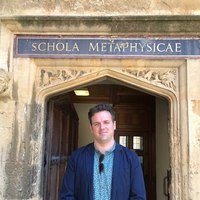Joseph Harroff
American University, Department of Philosophy and Religion, Faculty Member
- Philosophy, Creativity, Confucianism, Phenomenology of the body, Pragmatism (Philosophy), Somaesthetics, and 43 moreHistory, Manuscripts, Daoism, Performance and Philosophy; Improvisation; Irony and Singularity, Singularity Theory, Attention, Dispositif (Apparatus-Theory), Buddhism, New Materialism, Biopolitics, Comparative Philosophy, Hip-Hop/Rap, Philosophy of Hip-Hop, Shanghai Museum Bamboo Texts, Warring States (Chinese) Thought, Guodian Bamboo Manuscripts, Tsinghua Bamboo Manuscripts, Classical Chinese Philosophy, Chinese Philosophy, Race and Racism, Critical Race Theory, Aesthetics, Social and Political Philosophy, Political Philosophy, Ethics, Race and Ethnicity, Pragmatism, Hip Hop Culture, John Dewey, Political Theory, Philosophy Of Race, Yijing, Rhythmanalysis, Hauntology, Brian Massumi, Gilles Deleuze, Philosophy of Translation, Translation and Interpretation, Translation Studies, Translation, Translation and Ideology, Comparative Literature, and Hypatiaedit
This chapter discusses the role of jeong in Korean Buddhist films that explore the Mahayana premise that ultimate freedom is not to be found in an escape from the world of suffering, but rather in its compassionate embrace. Focusing on Im... more
This chapter discusses the role of jeong in Korean Buddhist films that explore the Mahayana premise that ultimate freedom is not to be found in an escape from the world of suffering, but rather in its compassionate embrace. Focusing on Im Kwon-taek’s film AjeAje Bara Aje, this chapter suggests that the jeong fused spiritual kinship between a Buddhist disciple and her superior facilitates the former’s recognition and embrace of the abject as none other than the self. This chapter views jeong as an ethical response to the other that finds resonance with Buddhist concepts of emptiness and interdependence.
Research Interests:
Research Interests:
Research Interests:
Research Interests:
Review of Chinese Metaphysics and Its Problems (Cambridge, 2015), eds. Chenyang Li and Franklin Perkins
Research Interests:
Research Interests:
Research Interests:
Research Interests:
Research Interests:
Introduction to 2nd Volume of a special issue of School and Society (2019) dedicated to the centennial celebration of John Dewey's sojourn to China.
Research Interests: Chinese Philosophy, Chinese Studies, Philosophy of Education, John Dewey, Confucian Philosophy, and 8 morePragmatism (Philosophy), Confucianism, Somaesthetics, Creative Intelligence, Culture and education, Body and Education, Philosophy of Education Values or Moral Education John Dewey, and Intercultural Compartive Philosophy
Introduction to the special issue of the John Dewey Society journal School & Society celebrating the centennial of John Dewey's educational mission through China.
Research Interests:
This CFP timeline will be extended to Febuary 2019.
Research Interests:
Review of Chinese Metaphysics and Its Problems (Cambridge, 2015), eds. Chenyang Li and Franklin Perkins
Research Interests:
My Master's thesis from Shandong University School of Philosophy and Social Development. It focuses upon the hermeneutical thinking of the Song dynasty Confucian philosopher Zhu Xi (1130-1200) and the work of the German philosopher H.G.... more
My Master's thesis from Shandong University School of Philosophy and Social Development. It focuses upon the hermeneutical thinking of the Song dynasty Confucian philosopher Zhu Xi (1130-1200) and the work of the German philosopher H.G. Gadamer (1900-2002) on the effective understanding of traditions.
Research Interests:
翻譯吾的文章關於物化問題在西方馬克思主義和中國古代道家哲學.
Research Interests:
Research Interests:
A potential avenue for infusing Daoist sensibilities into critical theory and within creative democratic projects more generally.
Research Interests:
translation I did of Sham Yat Shing's classic 1977 essay.
Research Interests:
Research Interests:
Here I deferentially give a reading of some aspects of Steven Angle's book.
Research Interests:
Forthcoming with University of California Press--Great Transformations Series
Research Interests:
In this paper, I will engage the thought of Arendt on the political-ethical ontology of “sheer human togetherness” while problematizing some of her assumptions and conclusions by appealing to some insights found in early Confucian... more
In this paper, I will engage the thought of Arendt on the political-ethical ontology of “sheer human togetherness” while problematizing some of her assumptions and conclusions by appealing to some insights found in early Confucian discourse on the significance of somaesthetics in the performance of ritually constituted roles. My main argument will be that while the event of Arendt’s thinking will continue to challenge us with its promise of radical democratic praxis, her reliance on a rigid dichotomy between the public/private leads to a number of problematic conclusions that fail to do justice to the role of the body in disclosing the mutually shared space of appearance in a co-originary spacing of political Dasein.
Research Interests:
Film Series Cinema as an artform seems to be a quite suitable medium for conveying the Buddhadharma. This is not just because we live in a post-‐ modern age saturated by visual and digital media; but, perhaps more profoundly, this happy... more
Film Series Cinema as an artform seems to be a quite suitable medium for conveying the Buddhadharma. This is not just because we live in a post-‐ modern age saturated by visual and digital media; but, perhaps more profoundly, this happy coincidence of ancient wisdom and modern technology allows for reflection upon how certain experiences of viewing film can in some sense mirror Buddhist teachings about enlightenment. Since truly appreciating a film requires an attempt to empathically step into an imaginary world that we are sensorily and emotionally (i.e. bodily) engaging with via the disclosive power of this particular multi-‐modal medium. Taking changing images as reality (which has to happen to some degree, at least if we are really engaging with a film) is also involved in the realization that everything is without a fixed, abiding essence. But realization of the emptiness of all things certainly doesn't lead to ethical nihilism in the Buddhist tradition. The Buddhist path of liberation asks one to take an ironically detached
